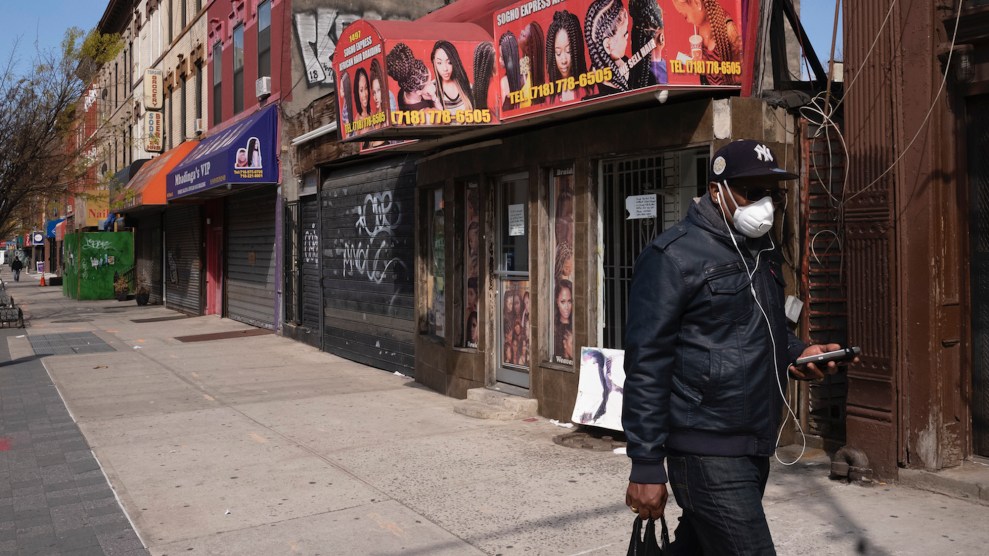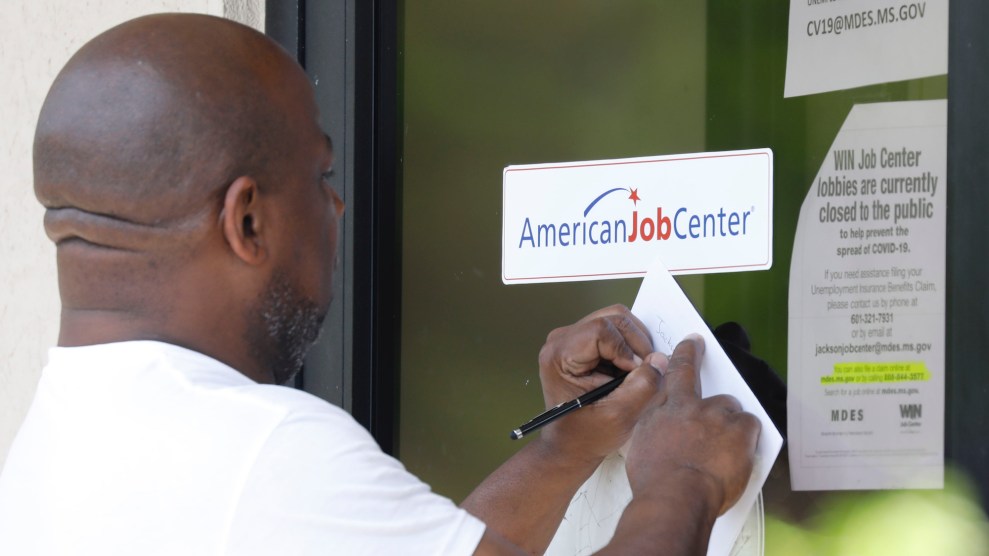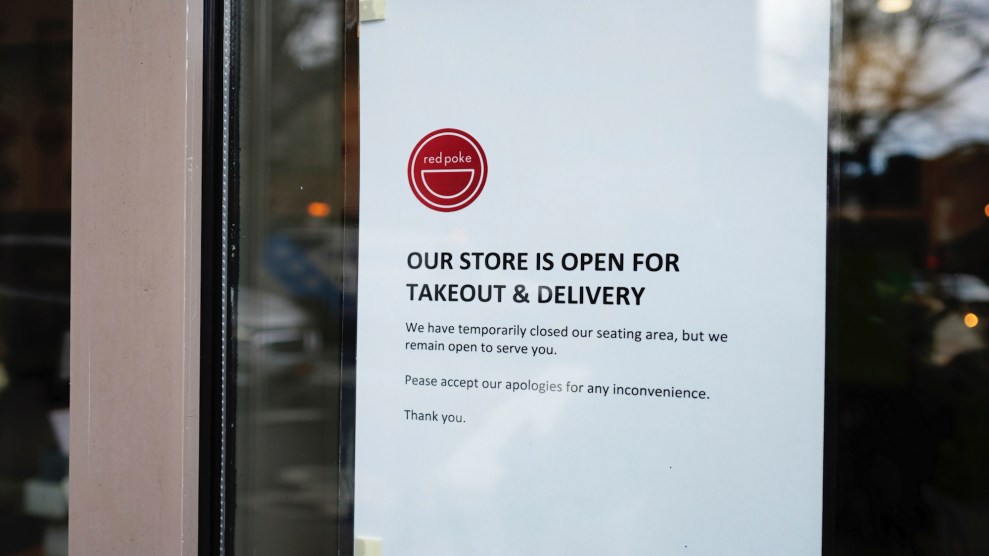
A man wearing a mask walks past businesses closed due to the coronavirus pandemic, in the Bedford Stuyvesant neighborhood of New York.Mark Lennihan/AP
K.B. Brown hasn’t opened the doors of his North Minneapolis print shop since March 27, the day Minnesota Gov. Tim Walz issued stay-at-home orders that forced nonessential businesses to close. A few thousand dollars’ worth of merchandise is sitting in his shuttered storefront, and he won’t be paid for most of it until customers can safely retrieve it. To keep some money coming in, Brown’s wife took a job at the local Amazon warehouse sorting packages four days a week, working double shifts on two of those days.
“We’re…scared,” Brown tells me. He chooses the word slowly and deliberately before releasing a nervous laugh. Brown and his wife started the business, Wolfpack Promotionals, in 2014. After limping along for a few years, they earned $200,000 in revenue in 2019, their best year yet. “We were looking at 2020 as a very big year for us,” he says. “At this point, I want a redo.”
Like other small business owners, Brown hoped to take advantage of provisions in the CARES Act, the $2 trillion pandemic relief package Congress passed last month. He asked Wells Fargo—a banking behemoth he’s done business with for years—about applying for a Small Business Administration disaster loan or the Paycheck Protection Program, a pot of money meant to help small businesses cover payroll and other expenses during the coronavirus crisis. (Money for both types of loans comes from the SBA, but the government relies on commercial banks and other lenders to process the PPP loans.)
Brown says Wells Fargo provided no helpful details, and he hasn’t applied for the financing. “For a lot of the SBA stuff and other loans, you have to be ‘bankable,’” Brown tells me. “So if you couldn’t get a loan from the bank before, you’re just screwed. And many of us are in that position.”
By “us,” Brown is referring to fellow Twin Cities entrepreneurs who, like Brown, are black. Many have less-than-stellar credit, a side effect of the lengths they had to go to in order to start their businesses. Technically, the PPP doesn’t require a minimum credit score, but some potential borrowers aren’t convinced the program will live up to that promise. The distrust is no surprise: Discriminatory government policies, dating back to Reconstruction, have made connecting black business owners with financing a daunting task.
“The system has never served them and has been the cause of a lot of harm,” says Felicia Perry, the executive director of the West Broadway Business and Area Coalition, a group that supports businesses in Brown’s neighborhood. “There’s a real trust gap there.”
In a statement, Wells Fargo said it is “working as quickly as possible to assist small business customers with the Paycheck Protection Program…in compliance with the regulations and guidance provided by US Treasury and the SBA.”
When the pandemic took hold in the United States, lawmakers rushed to protect entrepreneurs in a manner that was swift, bipartisan, and—on its face—equitable. “All loan terms will be the same for everyone,” declares the Treasury Department’s PPP fact sheet. But we now know that those equal “terms” did not translate into equal access to the federal funds. Banks screened out businesses that they hadn’t previously lent money to and reportedly gave preferential treatment to wealthier clients.
After just two weeks, the PPP fund ran out of money altogether. On Tuesday, congressional leaders announced a $310 billion deal to replenish it. But the additional money may not be enough to rescue people like Brown. Black business owners headed into the pandemic with smaller savings accounts, more debt, and less access to banks and capital than their white counterparts. The results could be catastrophic. “If you focus just on this moment, you miss the big picture,” says Mehrsa Baradaran, a wealth inequality expert and law professor at the University of California, Irvine. “You have to understand the history of how we got here.”
Walz’s formal decree late last month didn’t actually make much of a difference in Brown’s finances: In March 2019, Wolfpack had pulled in $18,000 dollars in revenue. This March, as fear spread and the economy ground to a halt, it took in just $2,500. When Brown officially closed his shop following the governor’s order, he divvied up the company’s 2020 profits among himself and his four employees, all of whom are now collecting unemployment. The Phillips Family Foundation, a Minnesota non-profit run by the family of Rep. Dean Phillips (D-Minn.), has placed a few preorders for when business resumes. “It’s not plugging the hole, but it’s slowing down the leak,” Brown says.
Brown’s current circumstances are all the more heartbreaking when you learn what he went through to open his shop—which is to say, in his words, “hell.” In April 2014, he says, he consulted a financial adviser to secure seed money for $40,000 in printing and embroidery equipment. In the end, he only got $25,000—and the adviser charged a $15,000 fee. A lawyer helped them reverse that payment, but Brown’s wife’s credit score plummeted as the couple struggled to pay the manufacturer. To raise funds, Brown and his wife took out a loan against their home equity; eventually they were threatened with foreclosure. Brown’s wife tapped her state employee retirement account to pay off the debt, but the owner of the loan claims the Browns still owe roughly $2,000 in taxes and fees. These days, Brown ignores their calls—as well as those from his cable provider and his credit card issuer, all clamoring for overdue bills.
The obstacles Brown faced are common among African American entrepreneurs. They tend to rely heavily on their own personal finances to start businesses, despite the fact that the median black household has just one-tenth the wealth that the median white household has. These circumstances make it unlikely that would-be black business owners have liquid capital to spare—or know others who do. “In the case of most African American nascent small businesses owners, there isn’t going to be a ‘friends and family’ round of financing,” says Rachel Atkins, an assistant professor at New York University who studies racial disparities in entrepreneurship. “They don’t have those resources in their personal networks.”
That makes bank loans even more important for Black-owned businesses to get off the ground, though their prospects of actually getting the money they need are dim. A 2017 study from the Federal Reserve Banks of Atlanta and Cleveland found that black businesses owners apply for funds at a 10 percent higher rate than white-owned firms, but their approval rates are nearly 20 percent lower. When black entrepreneurs do get approved for financing, only 40 percent receive the full amount they requested, compared to 70 percent of white business owners. Forty percent of black business owners surveyed are so pessimistic about their chances of being approved for bank loans that they don’t even bother to apply.
A recent study by the New York Fed classified nearly three-quarters of white-owned firms as “healthy” or “stable,” while only 43 percent of Black-owned businesses earned those ratings. “From the moment W.E.B. DuBois started collecting data through today, most black businesses are tiny—‘pebbles on the shore of business enterprise,’ he called them,” UC Irvine’s Baradaran explains. “They’re undercapitalized and highly vulnerable to any dip or sway in the economy.”
These factors are now conspiring against black businesses as they struggle to obtain PPP loans. Black-owned firms often rely on community-development financial institutions—lenders focused on underserved populations—many of which still lacked access to the SBA system as of last week. In recent years, large banks have closed more branches in majority-black communities than elsewhere, an exodus that’s stymied the flow of credit into local small businesses. And because banks receive bigger fees for bigger loans, they’re incentivized to prioritize the applications of larger firms. “It makes total sense that Black-owned firms would end up at the bottom of the list,” NYU’s Atkins says. “We’re now witnessing the layering effect of these decisions in the midst of a crisis.”
Perry says those dynamics are already playing out in the majority-black North Minneapolis neighborhood, where she spends much of her time reaching out to businesses to explain the SBA loans’ eligibility criteria. Some business owners she speaks to tell her they haven’t looked at the applications yet. There’s a variety of reasons: Some are dealing with the acute trauma of loved ones dying from the disease. Some don’t feel like they have the information they need to submit an application. Others feel too discouraged by past financing failures to try. She doesn’t know of any that have successfully received federal funding.
The structure of the loans is also an issue. Though a PPP loan can be forgiven if it’s used to cover payroll, rent, and utility costs, it’s likely that only 25 percent of it can be used for non-payroll expenses. Most Black-owned firms are like Brown’s—they have just a handful of employees, making them eligible for a much smaller slice of the pie.
Any part of a PPP loan that isn’t forgiven must be paid back within two years, which could pose a hardship for entrepreneurs like Brown who are dealing with other forms of debt. And the terms of debt relief offered to black Americans have historically put them at a disadvantage. Amanda Fischer, the policy director for the Washington Center for Equitable Growth, cites the Home Affordable Modification Program, a federal initiative to help struggling homeowners avoid foreclosure during the Great Recession. “There were studies showing that black and brown borrowers were less likely to get loan modifications, and when they got loan modifications, the terms were more punitive than white borrowers,” Fischer explains. “I’m thinking about businesses working ad hoc with debt collectors and landlords to work out deals to bridge the gap. There’s probably going to be discrimination that plays out that way, too.”
The disparity is grounded in a legacy of discriminatory policy. Baradaran points to the systematic exclusion of blacks from government-backed programs—such as the GI Bill and Federal Housing Administration loans—that allowed white families to build wealth over the course of the 20th century but left black families further behind. And she compares the potential for an extinction-level event among black businesses to the higher COVID-19 death rates among black Americans—a result of segregation, economic inequality, and environmental injustice.
“Coronavirus is clearly not racist: It’s a big, dumb virus that we’re all susceptible to,” she explains. “But any colorblind policy, whether one that deals with public health or access to credit, is going to be unfair to black communities”—because colorblind policies fail to account for the impact of racial inequality.
Right now, colorblind policy is the only policy Congress has. Democrats had initially demanded $125 billion be set aside for small and mid-size banks, in hopes of reaching more vulnerable entrepreneurs. They also called for “improvements to ensure all eligible small businesses can access this critical funding and are not turned away by banks.” The final package earmarked just $60 billion for smaller lenders, and no such improvements were included.
So what else can be done? Bharat Ramamurti—a former staffer for Sen. Elizabeth Warren (D-Mass.) who serves on the congressional panel overseeing coronavirus relief funds—recommends paying banks a flat fee for each transaction and connecting them with applicants via independent clearinghouses, in order to prevent smaller, less-connected firms from getting shut out.
Fischer wants to see aggressive oversight of the lending and a moratorium on debt collection. In a paper published this month, she also advocates for the elimination of the rules governing how the PPP funds can be used. She warns that if the loans that do reach smaller firms end up being too modest to help them retain their employees, those businesses could be stuck with debts they can’t pay back. The end result, she predicts, will be that a widening wealth gap as industries shrink and consolidate around a few key players.
Brown worries this is already happening in his Minneapolis neighborhood. “The African American population has little or nothing when it comes to commercial stores, businesses, housing—you know, in terms of ownership,” he says, and the coronavirus crisis is only making things worse. “The existing population is losing ground.”
For now, Brown is making masks out of discarded T-shirt samples and donating them to the Hennepin County Medical Center, local police officers, and some elderly neighbors. He volunteers with his local business association to distribute hand sanitizer to the few intrepid business owners whose doors remain open. He doesn’t have a lot of faith that the government will do much to help him.
“Until those senators and representatives are put in the same boat as the population they’re supposed to be representing, we’ll never get anywhere,” Brown says. “They have to struggle like we are struggling before they can actually understand.”


















